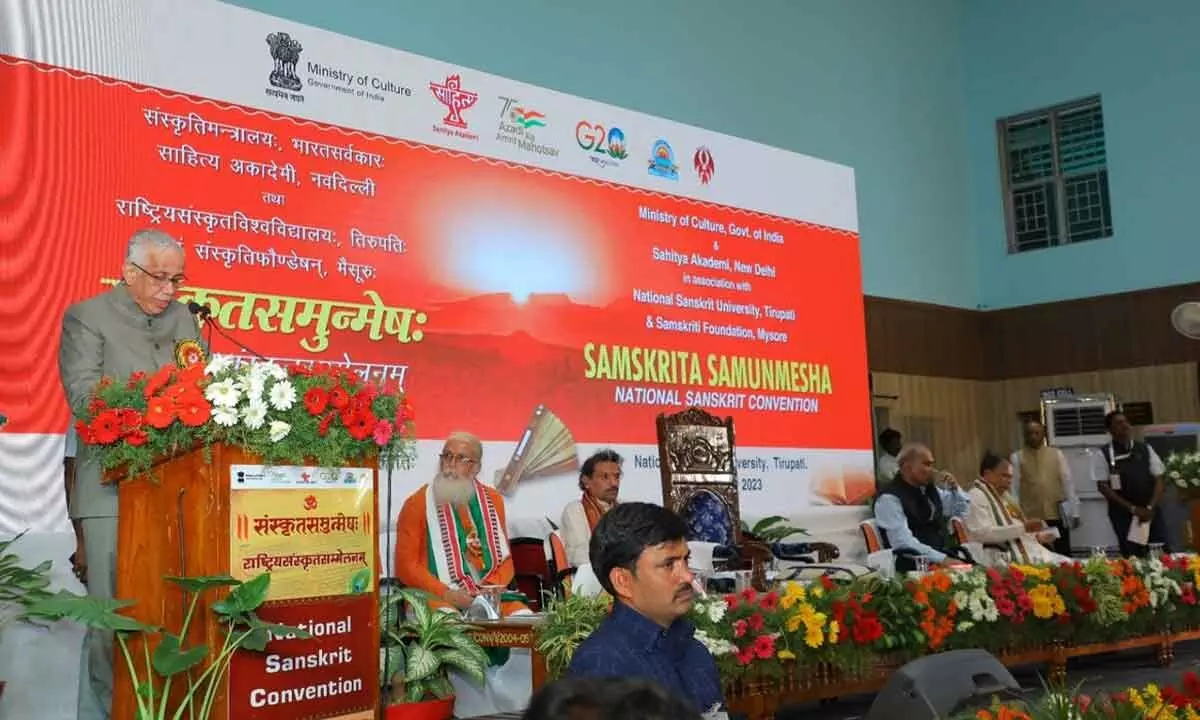Sanskrit is the cradle of many civilizations, languages & cultures

Governor S Abdul Nazeer speaking at the valedictory function of the three-day National Sanskrit Convention at NSU in Tirupati on Friday
Tirupati: Sanskrit is the cradle of many civilizations, languages and cultures across the world and it had a deep impact on many languages and cultures that were not even geographically connected to the Indian sub-continent, said Governor S Abdul Nazeer while speaking at the valedictory function of the three-day national Sanskrit convention here at National Sanskrit University (NSU) here on Friday.
Quoting Mahatma Gandhi who said, “Without the study of Sanskrit one cannot become a true Indian and a true learned man,’’ the Governor said the ancient language is the most musical and also self-sufficient language of the world and it is highly mathematical and complete for the human vocal system.
The language which contributed to many knowledge systems in the past 3,000 years and being mathematical and logical in nature, it is also highly amenable to computational logic and can be applied in highly advanced network systems, he said and quoted Rick Briggs, the NASA scientist who said that Sanskrit language is one of the most suitable one among the pool of many human languages to be converted into a computing programme for robotic control and Artificial Intelligence technology.
Even today, Sanskrit is the first language for five villages in Karnataka and Madhya Pradesh, he said and added that the languages spoken in China, Thailand, Sri Lanka, Indonesia, Malaysia, Philippines, have been enormously influenced by Sanskrit.
Not only religious and philosophical works but during ancient and medieval times it contributed to various sciences and legal digests and also to the fields of mathematics, astronomy, metallurgy, agriculture, cognitive sciences, yoga, psychology, dance, music, literature, biology, civil engineering, jurisprudence and logic and also arts.
The works like Bharata’s Natya Shastra, Vishnudharmottara Purana, Samarangana Sutradhara, Saranga Deva’s Sangita Ratnakara etc. amply highlight the deep understanding of various Indian art forms in ancient and medieval Sanskrit works. Sanskrit treatises on music clearly demonstrate ancient Indians’ accurate understanding and knowledge of sound, architecture etc.
The knowledge of Sanskrit opens a vast treasure of manuscripts, but to benefit from it, we need to develop a synergy between the ancient Indian tradition and modern science and technology for which the ministry of education developed two wings viz. Indian Knowledge Systems and Bharatiya Bhasha Samiti, to promote the Sanskrit language, he averred.
The revival of Sanskrit language will greatly enhance the pride in our own cultural heritage, and history, the Governor said, appreciating the conduct of national convention to shed more light on Sanskrit language.
NSU Vice-Chancellor GSR Krishnamurthy gave a detailed account of the deliberations of the three-day meeting. Sahitya Akademi secretary Dr K Srinivasa Rao, Akademi Advisory board member Hare Krshna Satapathy and TTD Vedic University Vice-Chancellor Rani Sadasiva Murthy also spoke.















